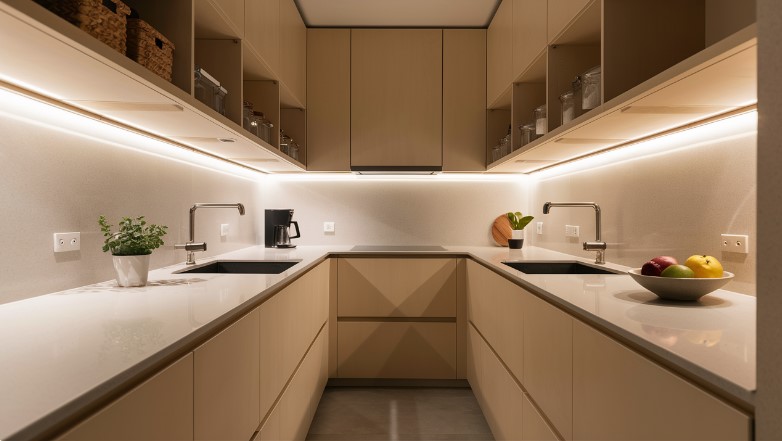Kitchen counters are vital. They serve for prep, snacks, and dropping items.
Yet, clutter makes kitchens chaotic. The good news? It’s easy to declutter.
Simplifying creates a clean, welcoming space. This makes cooking and gathering enjoyable.
This blog offers tips to streamline counters, boost efficiency, and highlight beauty.
We’ll discuss removing unused items, finding storage solutions, and keeping essentials nearby.
A clear counter is achievable. Let’s explore how to make your kitchen tidy and stress-free with minimal effort.
1. Assessing Your Current Situation
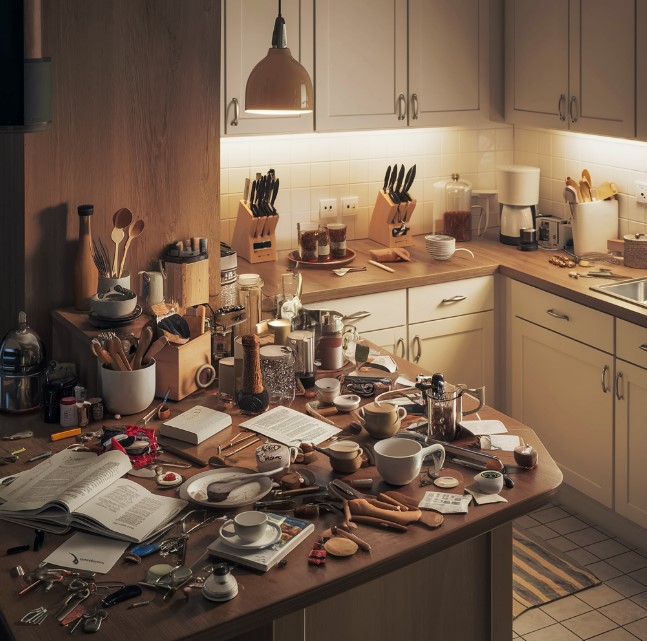
Identify Clutter Sources First, find items that clutter your kitchen counters. Common culprits are mail, keys, small appliances, and random objects.
Also, kitchen items like spices and utensils can be a problem. So can non-kitchen items like books. This makes it easier to identify clutter sources.
Evaluate Your Counter Space Measure your counters and what you need for cooking. Also, spot areas that attract unnecessary items.
Understanding your space and its purpose aids in deciding what to keep or discard.
Identify clutter sources and evaluate your space. This sets the stage for a tidier kitchen.
Aim to keep counters for daily items, like a coffee maker or knife block. Find storage for everything else.
2. Clear Everything Off the Counter
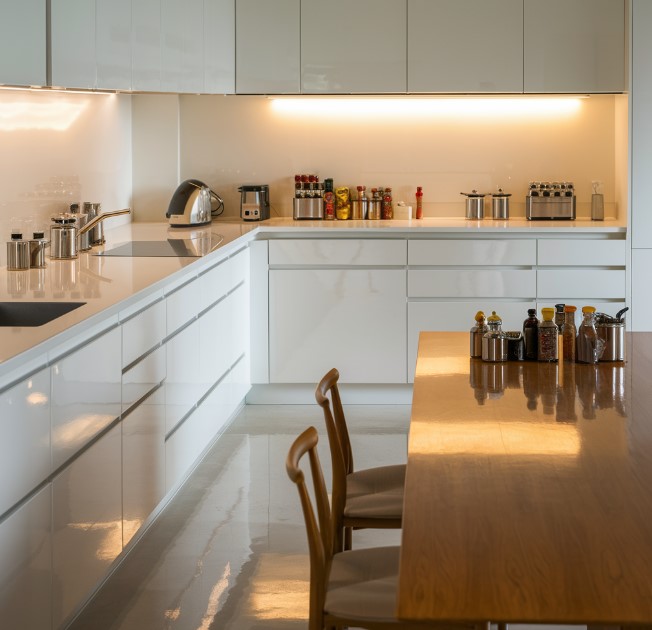
First, clear your kitchen counters. This helps you see the space and start fresh. Put everything on a nearby table, grouping similar items. This way, you can decide what belongs on the counter and what should be stored.
Next, clean the counters. Remove dust, crumbs, and stains. A clean counter makes it easier to imagine a clutter-free space.
When putting items back, ask yourself: Do I use this daily? Does it improve my kitchen? Only keep essential appliances and decor on the counter. Store or donate the rest.
This simple step kickstarts decluttering. A clear counter leads to a more organized, stress-free kitchen.
3. Sort Items into Categories
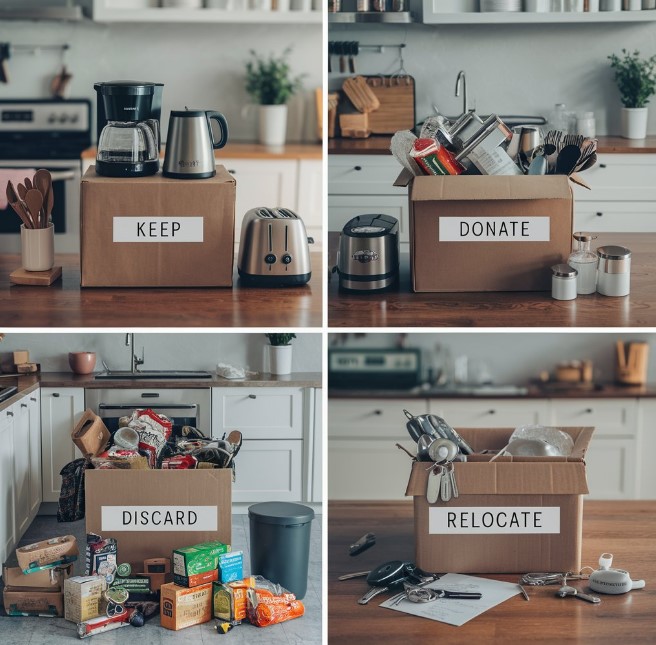
Sort items into four groups to clear your counters: keep, donate, discard, and recycle. relocate.
Keep: Include daily essentials like a coffee maker, toaster, or utensils. Only keep what you need and use often.
Donate: Add unused but good-condition gadgets or tools. They might be more useful to someone else.
Discard: Throw away broken items, expired food, or anything unusable. This step is crucial for space.
Relocate: Move items like mail or keys to their proper place.
This method helps you see what you truly need and love.
It makes your counters tidy and stress-free. Take it step by step, and your kitchen will feel fresh and organized!
4. Identify Daily Use Items
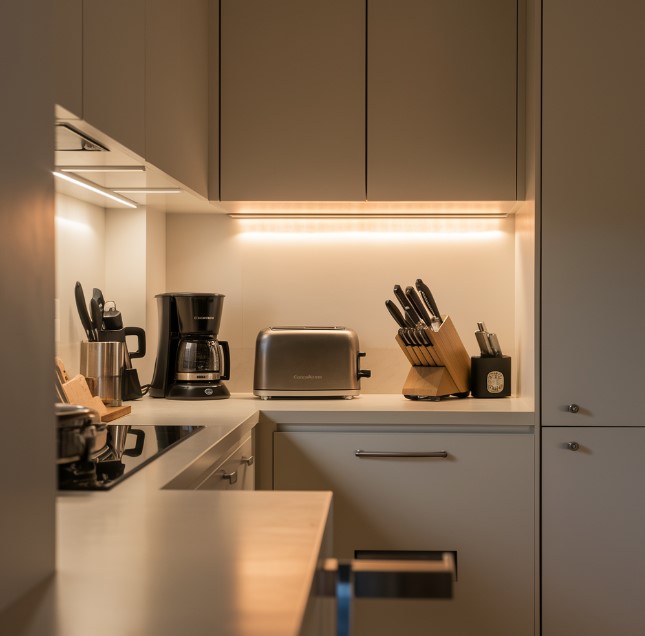
To keep your kitchen counters clear, first, identify daily items.
Consider essentials like your coffee maker, toaster, or knife block. These save time and should stay on the counter.
Next, store less-used items, like blenders or mixers, in cabinets. Aim for a functional, spacious counter.
Limiting counter items to daily essentials makes your kitchen more organized and attractive. It also eases cleaning and provides more cooking space.
This simple step can greatly improve your kitchen’s feel and function.
5. Eliminate Unused Appliances
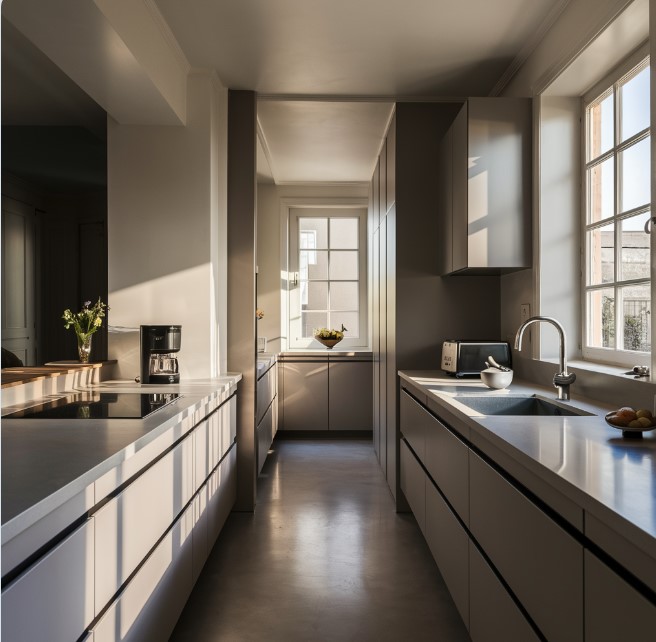
Clear your counters by removing unused appliances like a bread maker or old juicer. They crowd your space and make your kitchen feel small.
If you want to keep them, store them away. But, if you haven’t used them in a year, consider donating or selling them.
Getting rid of unused appliances tidies your kitchen. It makes room for daily items like your coffee maker and toaster.
A clean counter is inviting and makes cooking and cleaning easier. With less clutter, finding what you need is quicker. Remember, in the kitchen, less is often more!
6. Use Baskets or Trays for Organization
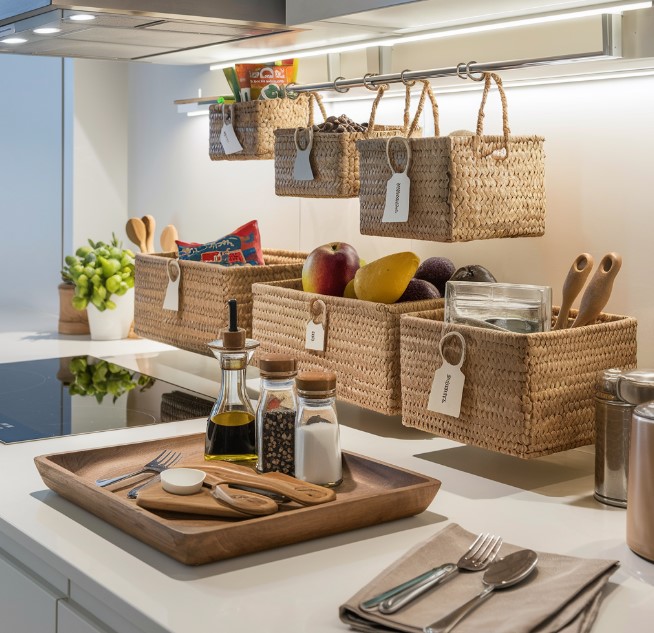
Baskets and trays are great for organizing kitchen counters. They keep items together, preventing mess.
For instance, group cooking oils, salt, and pepper on a tray near the stove. This setup makes cooking easier.
Baskets are perfect for snacks, fruits, or small tools. Choose ones that match your kitchen’s style.
This creates a neat, attractive look. Label baskets for items like coffee pods, tea bags, or utensils.
These organizers also make cleaning simpler. Just lift the basket or tray to wipe the counter. This saves time and keeps counters clear.
Give it a try. You’ll notice a big difference!
7. Create a Coffee or Tea Station
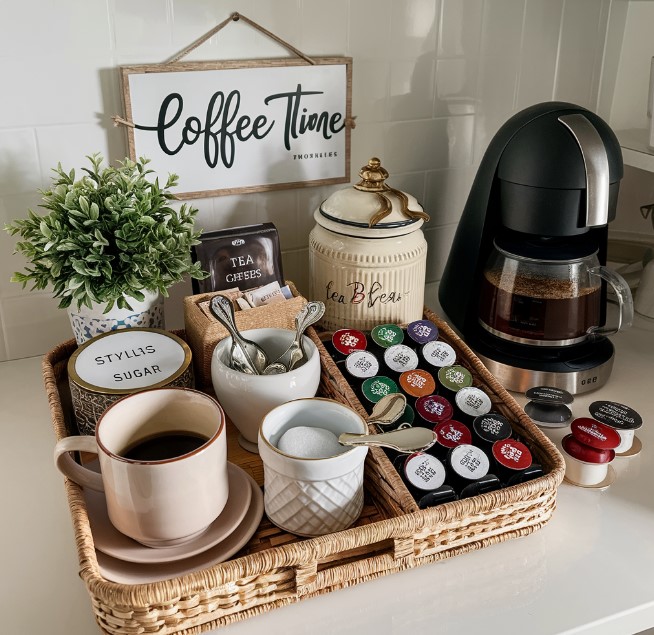
Turn your kitchen counter into a cozy coffee or tea station. First, pick a small area for your essentials.
Then, use a tray or basket to keep things organized. Include mugs, spoons, sugar, tea bags, or coffee pods. If you have a coffee maker or kettle, add those too.
For a welcoming touch, consider some décor. A small plant, a stylish jar, or a sign saying “Coffee Time” or “Tea Break” works well.
This setup keeps your counter tidy. It gathers everything in one place. This makes your morning routine faster and more enjoyable.
Creating a coffee or tea station is an easy way to save space and add charm to your kitchen.
8. Move Dish Drainers Inside the Sink
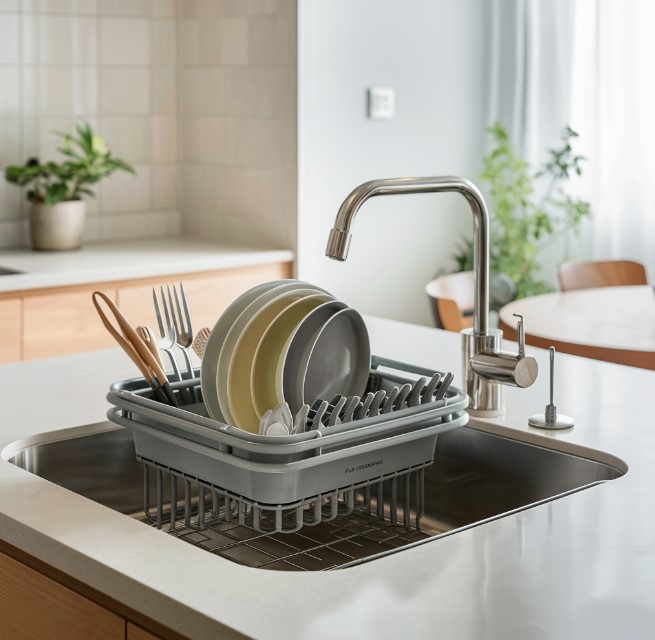
One easy way to declutter your kitchen counters is by moving the dish drainer into the sink. To save counter space, put it in the sink.
This keeps things neat and organized. This trick uses the sink space better. It keeps your counters clear for meal prep or decorations.
When dishes dry in the sink, water drips into the drain. This prevents a mess on the counter.
This setup also makes it easier to clean around your kitchen, as there’s less clutter to move aside.
If your sink is big enough, you can use a compact or collapsible drainer. It will fit snugly without being in the way.
This small change can make a big difference. It is especially true in small kitchens with limited counter space.
A clear kitchen counter makes the space feel open and inviting. It’s perfect for cooking or just enjoying the area.
9. Utilize Vertical Space
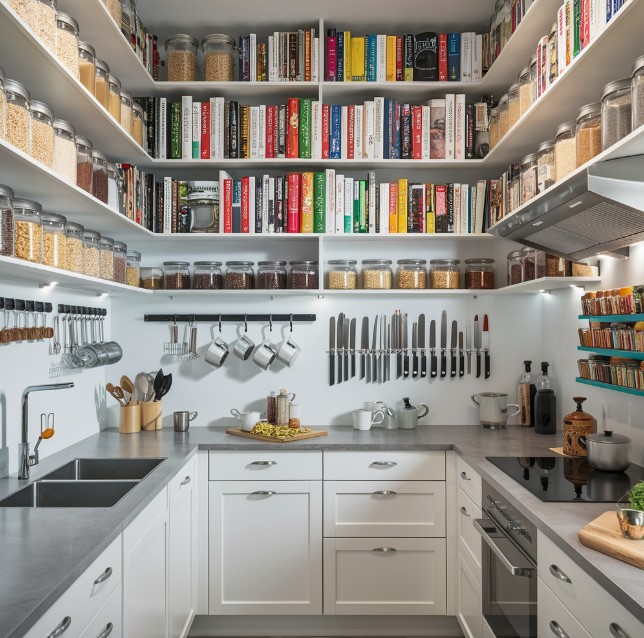
Use vertical space in your kitchen to maximize counters.
Install shelves for jars and cookbooks, keeping them off counters yet accessible. Use hooks for mugs, utensils, or small pots.
Magnetic strips are great for knives, while spice racks can also help.
This approach makes your kitchen organized and spacious without bulky furniture. It’s simple, budget-friendly, and suits any kitchen size.
Clear counters make cooking and cleaning easier. Mix hooks, shelves, and other vertical tools to customize your space.
This keeps counters tidy and functional. A few changes can create a clutter-free, efficient kitchen you’ll enjoy.
10. Implement a Wall-Mounted Paper Towel Holder
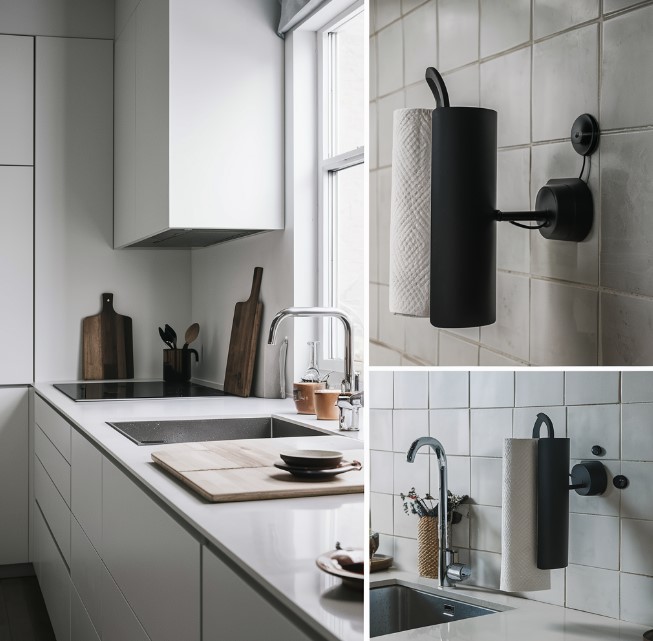
Save counter space by installing a wall-mounted paper towel holder.
Place it near your sink or cooking area to keep towels handy and free up space for chopping and mixing.
These holders are easy to install and come in various designs. Pick a convenient spot that won’t interfere with your work.
Renters can choose adhesive or suction-mounted options, avoiding drilling.
This simple change can tidy up a messy kitchen. A clear countertop is more attractive and makes cooking and cleaning easier.
Removing everyday items like paper towels creates a more open, relaxing kitchen.
11. Establish Daily Cleaning Habit
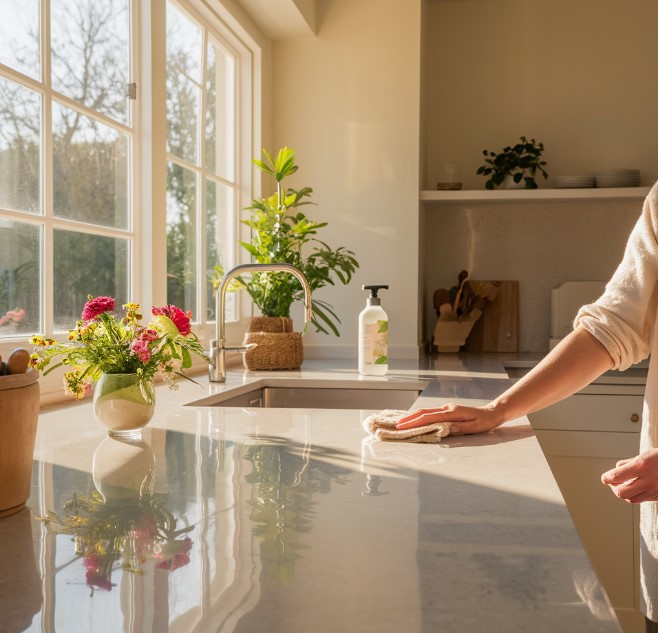
Clean your kitchen counters daily. It keeps your space tidy. Each night, take a few minutes.
First, clear away dishes, mail, and appliances. Then, wipe with a damp cloth and gentle cleaner.
Consistent practice of this habit prevents messes and maintains a fresh kitchen. It also makes mornings easier.
You wake up to a clean space. Teach everyone in your household this habit.
Cleaning daily takes little time. Yet, it controls clutter and keeps the kitchen functional. Consistency is key. It keeps your counters clear and your kitchen inviting.
12. Create a Junk Drawer
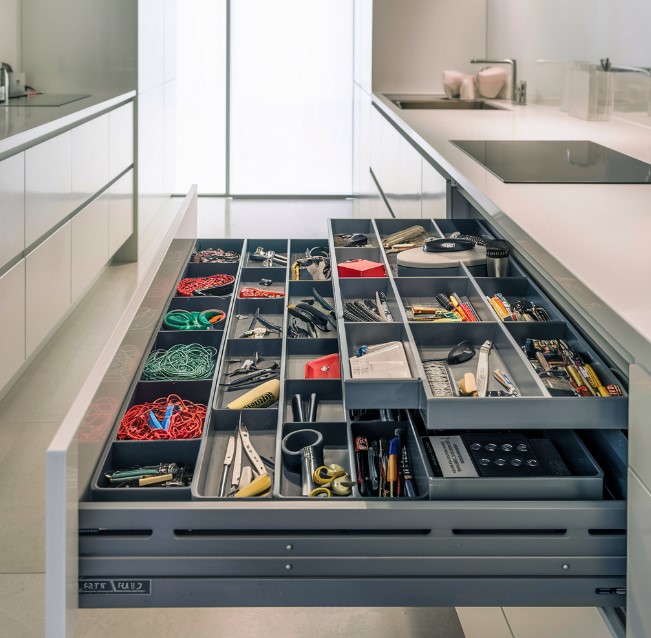
A junk drawer helps keep kitchen counters tidy. Instead of letting small items pile up, designate a drawer for them.
Store scissors, rubber bands, batteries, and pens in it. Use containers or dividers to organize items.
Avoid overstuffing the drawer. Spend a few minutes each month to clear it.
Throw away trash and relocate misplaced items. This keeps the drawer useful and prevents mess.
Giving odds and ends a home keeps counters clear and functional. Everything is easy to find.
A tidy junk drawer brings order to your kitchen and maintains a clutter-free space.
13. Use Turntables for Easy Access
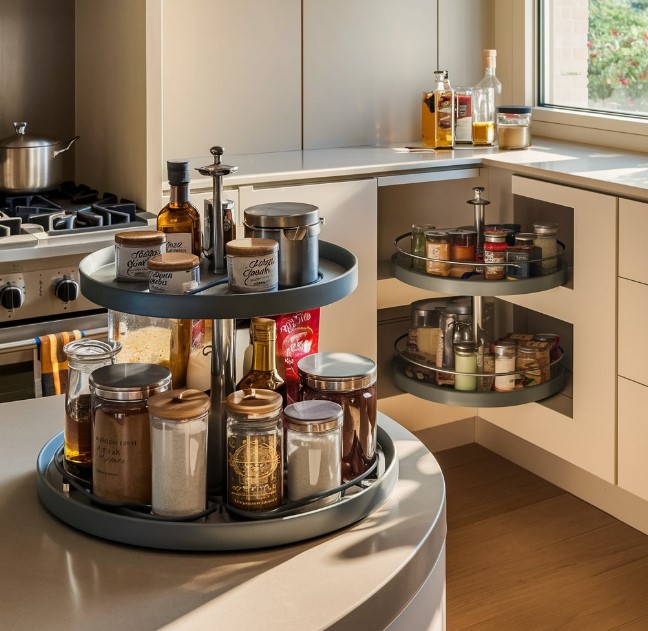
Turntables, or lazy Susans, are great for organizing kitchen counters. They store condiments, spices, oils, and other frequently used items.
Simply spin them to find what you need. This saves time and keeps counters tidy.
Opt for turntables with raised edges to prevent spills. Place one near the stove for easy access to salt, pepper, and oil.
For more storage, consider a two-tier turntable. It offers more space without extra footprint.
Turntables also work well in corners and tight spots. They make the kitchen more functional and less cluttered. Everything stays easy to reach.
14. Store Rarely Used Items in Cabinets
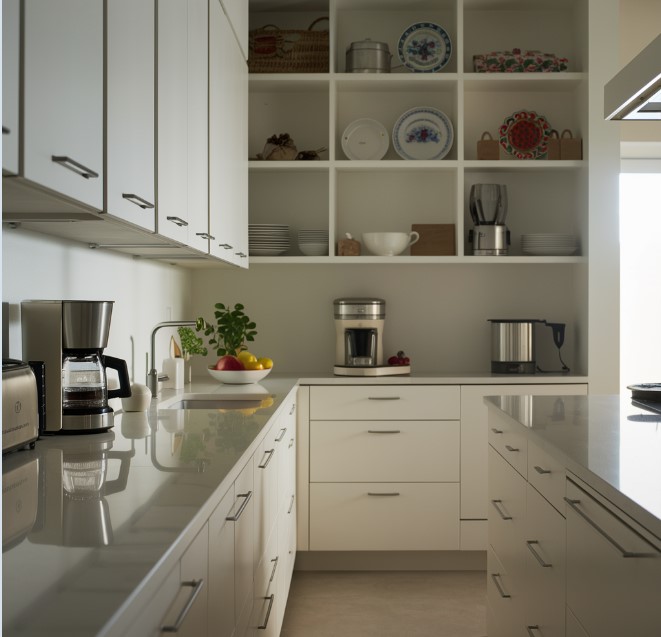
Keep kitchen counters clear by storing rarely used items in cabinets or high shelves.
For instance, holiday plates and seasonal tools, like ice cream makers, don’t need daily use.
They don’t need to be on the counter. Store special bakeware away while keeping it accessible.
This frees up space for daily tools like coffee makers and toasters. It also creates a cleaner look, making cooking and cleaning easier.
If cabinets are full, start by donating or discarding unnecessary items.
This keeps counters functional and attractive, ensuring a calm, organized space.
15. Develop Family Guidelines for Kitchen Use
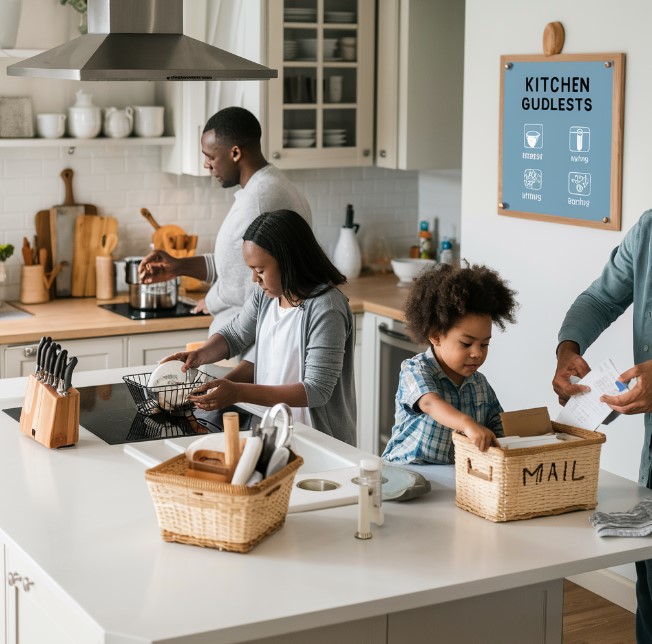
To keep kitchen counters clear, involve everyone. Make simple rules. For example, limit counters to cooking items only.
You cannot bring any paperwork, toys, or random items. Assign a spot for everything.
Use a basket for mail and a drawer for gadgets. This prevents clutter on the counters.
Teach everyone to clean as they go. This includes washing dishes, wiping spills, and putting things away. These small habits provide significant help.
Post rules where everyone can see them, like on the fridge or a bulletin board.
With teamwork, counters will stay tidy and ready. These guidelines ensure a clutter-free, stress-free kitchen for all.
16. Regularly Assess Counter Clutter
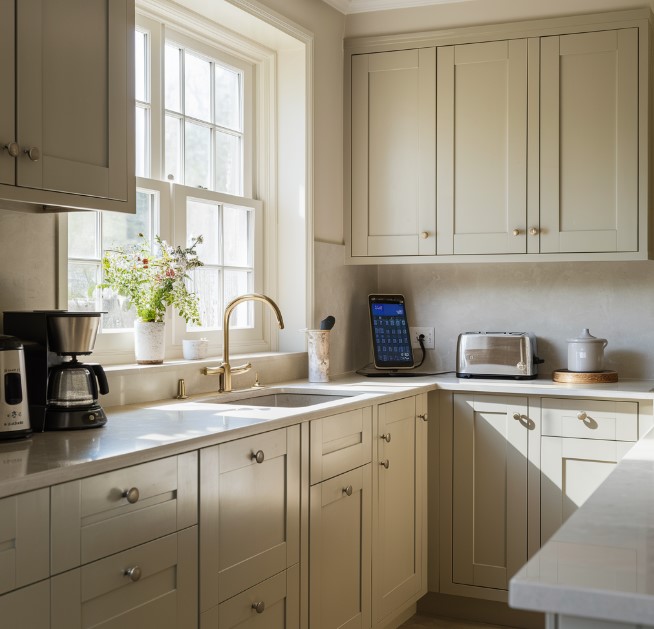
Each month, check your kitchen counters. Remove unused items or things that don’t belong. Start by clearing everything.
Then, return only daily essentials, like a coffee maker or toaster. Store everything else in cabinets, drawers, or the pantry.
This habit helps catch items that shouldn’t be there, like mail, keys, or gadgets.
Regular checks keep counters clear and organized. This makes your space feel open and clean.
Set a reminder on your phone or calendar for this routine.
It takes little time but keeps your kitchen tidy and stress-free.
Clear counters mean more room to cook and enjoy your space!
17. Involve Family Members in the Process
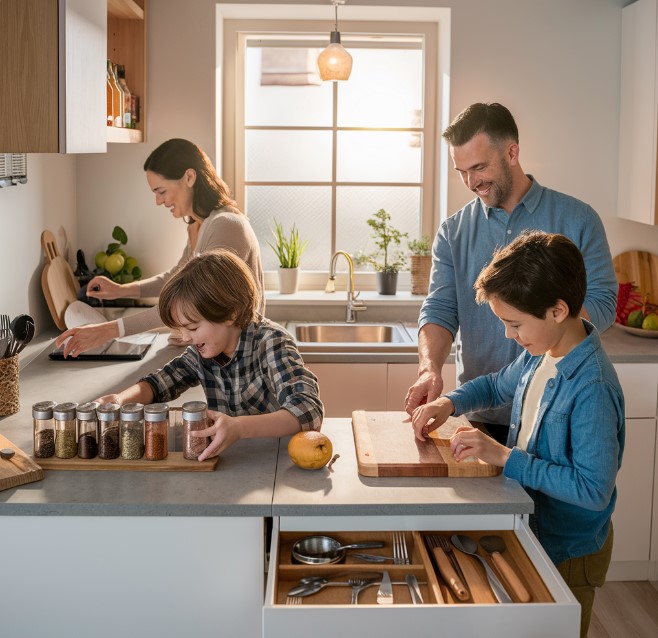
A clean kitchen is easier with everyone’s help. Teach your family to keep the counters tidy.
Explain that an organized kitchen makes cooking faster and more fun.
Start with simple rules. For example, put things back after use.
Give each person a small task. After meals, someone can clear the counters. Another can organize utensils.
Make it a game or set a timer for the fastest cleanup.
Encourage teamwork. Involve kids in sorting and labeling. Show them how to group items. Keep spices together.
Arrange the cutting boards in an orderly manner. Praise their efforts to encourage good habits.
When everyone helps, the kitchen stays organized. Cooking and family meals become more enjoyable. It also sets a good example for a clean home.
Conclusion
Cleaning up kitchen counters is crucial. It makes your kitchen more functional and welcoming.
Focus on essentials to cut clutter and boost efficiency. Keep often-used items nearby. Store others in cabinets or drawers.
Use baskets, trays, or wall racks to save space. Inspect your kitchen setup on a regular basis to maintain order.
A clear counter improves your kitchen’s look and creates a calmer cooking space.
Aim for simplicity and organization. This way, your kitchen will blend functionality and style.
1. Why do kitchen counters get cluttered so easily?
Kitchen counters are the most accessible surfaces in a home. They accumulate clutter with little effort.
People often place utensils, small appliances, or groceries there for easy access.
Counters also become mail, keys, or gadgets’ drop zones, especially without designated spaces.
Inadequate storage or poor organization in cabinets causes clutter on the counters.
Moreover, lacking cleaning routines or keeping “just-in-case” items adds to the clutter.
Busy lifestyles and multitasking in the kitchen worsen the problem. People leave items out during meal prep or forget to put them away.
Better storage and addressing these habits can cut counter clutter. It will make the kitchen feel more organized.
2. How do I start decluttering my kitchen counters without feeling overwhelmed?
To clear your kitchen counters, follow these steps. First, remove everything.
Then, group similar items: utensils, appliances, and decor. This helps you see what you have.
Next, decide what to keep. Ask, “Do I use this often? Is it necessary?” Keep only essentials, like a coffee maker or cutting board. Store the rest.
Work in short bursts of 15 to 20 minutes. Focus on one area each day.
Finally, set rules. Give daily items a specific spot.
Avoid adding unrelated things. Check your counters at regular intervals.
3. What items should I keep on my counters versus putting away?
When organizing your kitchen, rank function and space. Keep daily items like the coffee maker, toaster, and knife block on the counter for easy access.
Also, consider adding a fruit bowl or a small spice rack.
Store less-used items like mixers and slow cookers in cabinets or the pantry. Limit decorative pieces to avoid clutter.
Think about your cooking flow. Keep essentials close and store the rest. Use wall racks or magnetic strips to save counter space while keeping tools handy.
Aim for a balance between function and a tidy, open surface. This makes your kitchen more inviting and efficient.
4. How often should I declutter my kitchen counters?
How often you declutter kitchen counters depends on your habits and usage. To prevent buildup, do it every day. Spend a few minutes putting away items like mail, dishes, or appliances.
For a deeper clean, check counters weekly. Reorganize, wipe surfaces, and keep only the essentials.
Busy kitchens might need checks twice a week. Quiet ones can do it every two weeks or monthly.
Regular decluttering makes it easy. It keeps counters functional, clean, and nice without feeling like a chore.
5. What are the best storage solutions to keep counters organized?
To organize kitchen counters, consider these solutions:
Wall shelves: Store spices and jars above counters to free up space.
Drawer organizers: Use dividers for utensils and tools, keeping them hidden yet accessible.
Under-cabinet storage: Pull-out baskets for pots and pans reduce clutter.
Over-sink racks: Shelves for soap and sponges maximize vertical space.
Counter organizers: Use multifunctional holders or trays for essentials.
Declutter: Keep only necessary items. Store others in cabinets or the pantry
These methods make use of vertical and hidden spaces for better order.
